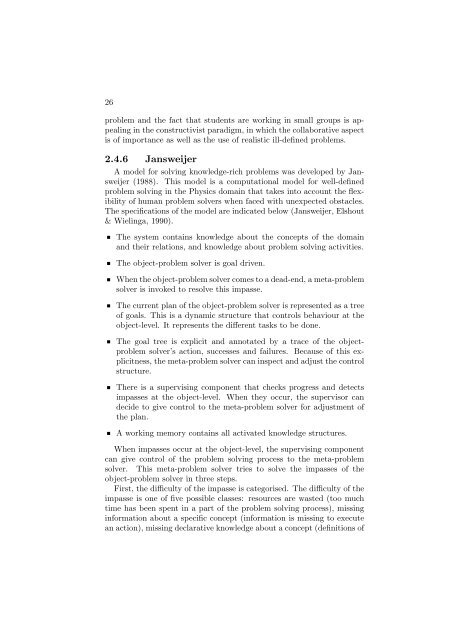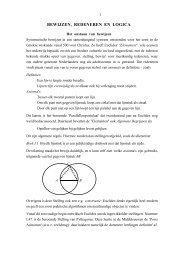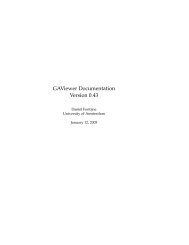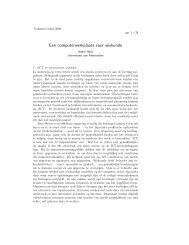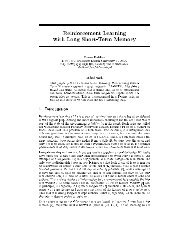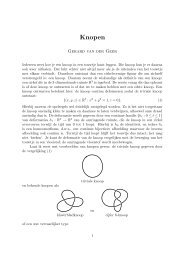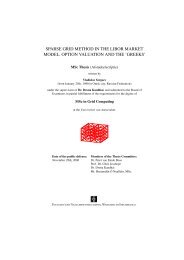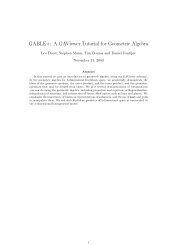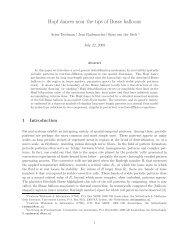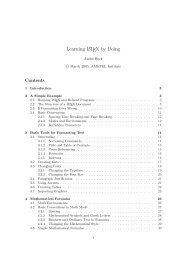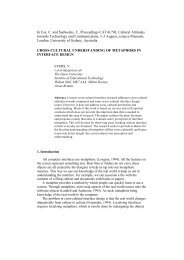The role of metacognitive skills in learning to solve problems
The role of metacognitive skills in learning to solve problems
The role of metacognitive skills in learning to solve problems
You also want an ePaper? Increase the reach of your titles
YUMPU automatically turns print PDFs into web optimized ePapers that Google loves.
26<br />
problem and the fact that students are work<strong>in</strong>g <strong>in</strong> small groups is appeal<strong>in</strong>g<br />
<strong>in</strong> the constructivist paradigm, <strong>in</strong> which the collaborative aspect<br />
is <strong>of</strong> importance as well as the use <strong>of</strong> realistic ill-def<strong>in</strong>ed <strong>problems</strong>.<br />
2.4.6 Jansweijer<br />
A model for solv<strong>in</strong>g knowledge-rich <strong>problems</strong> was developed by Jansweijer<br />
(1988). This model is a computational model for well-def<strong>in</strong>ed<br />
problem solv<strong>in</strong>g <strong>in</strong> the Physics doma<strong>in</strong> that takes <strong>in</strong><strong>to</strong> account the flexibility<br />
<strong>of</strong> human problem <strong>solve</strong>rs when faced with unexpected obstacles.<br />
<strong>The</strong> specifications <strong>of</strong> the model are <strong>in</strong>dicated below (Jansweijer, Elshout<br />
& Wiel<strong>in</strong>ga, 1990).<br />
<strong>The</strong> system conta<strong>in</strong>s knowledge about the concepts <strong>of</strong> the doma<strong>in</strong><br />
and their relations, and knowledge about problem solv<strong>in</strong>g activities.<br />
<strong>The</strong> object-problem <strong>solve</strong>r is goal driven.<br />
When the object-problem <strong>solve</strong>r comes <strong>to</strong> a dead-end, a meta-problem<br />
<strong>solve</strong>r is <strong>in</strong>voked <strong>to</strong> re<strong>solve</strong> this impasse.<br />
<strong>The</strong> current plan <strong>of</strong> the object-problem <strong>solve</strong>r is represented as a tree<br />
<strong>of</strong> goals. This is a dynamic structure that controls behaviour at the<br />
object-level. It represents the different tasks <strong>to</strong> be done.<br />
<strong>The</strong> goal tree is explicit and annotated by a trace <strong>of</strong> the objectproblem<br />
<strong>solve</strong>r’s action, successes and failures. Because <strong>of</strong> this explicitness,<br />
the meta-problem <strong>solve</strong>r can <strong>in</strong>spect and adjust the control<br />
structure.<br />
<strong>The</strong>re is a supervis<strong>in</strong>g component that checks progress and detects<br />
impasses at the object-level. When they occur, the supervisor can<br />
decide <strong>to</strong> give control <strong>to</strong> the meta-problem <strong>solve</strong>r for adjustment <strong>of</strong><br />
the plan.<br />
A work<strong>in</strong>g memory conta<strong>in</strong>s all activated knowledge structures.<br />
When impasses occur at the object-level, the supervis<strong>in</strong>g component<br />
can give control <strong>of</strong> the problem solv<strong>in</strong>g process <strong>to</strong> the meta-problem<br />
<strong>solve</strong>r. This meta-problem <strong>solve</strong>r tries <strong>to</strong> <strong>solve</strong> the impasses <strong>of</strong> the<br />
object-problem <strong>solve</strong>r <strong>in</strong> three steps.<br />
First, the difficulty <strong>of</strong> the impasse is categorised. <strong>The</strong> difficulty <strong>of</strong> the<br />
impasse is one <strong>of</strong> five possible classes: resources are wasted (<strong>to</strong>o much<br />
time has been spent <strong>in</strong> a part <strong>of</strong> the problem solv<strong>in</strong>g process), miss<strong>in</strong>g<br />
<strong>in</strong>formation about a specific concept (<strong>in</strong>formation is miss<strong>in</strong>g <strong>to</strong> execute<br />
an action), miss<strong>in</strong>g declarative knowledge about a concept (def<strong>in</strong>itions <strong>of</strong>


